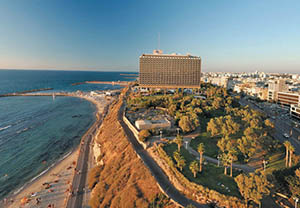
The Vista Club at Tel Aviv Hilton sits 17 stories above the Mediterranean shoreline. As Hilton’s Israel chief, Ronnie Fortis, spoke to reporters over breakfast late last month, storm clouds began to roll in and obscure the panoramic view.
Arguably Israel’s top hotelier, Fortis is attuned to the tremors rippling through Israel’s hospitality industry as a wave of Palestinian stabbing attacks generates bloody headlines and spooks tourists.
“I’d be stupid to tell you there’s no effects,” he said. “But we don’t really feel it.”
As he spoke, the storm began in earnest, and the three walls of windows began to shake loudly. But inside, breakfast went on without a hitch.
The analogy is hard to miss: Even as violence rages in full view, Israeli society refuses to miss a beat.
When it comes to the international community, Israel’s messaging strategy seems paradoxical. Yes, the country faces an ideological enemy intent on destroying its way of life with all available means, including knives and cars. But is it safe to visit? Absolutely.
The strategy appears to be working. At key tourists sites like Masada and Caesaria, the tour busses are parked half a dozen deep.
In an Oct. 11 press release, the Israeli Tourism Ministry noted that the 225,000 tourists that entered the country in September is 25 percent more than last year’s figure, and 6 percent more than the year before.
And in the middle of a tumultuous October, the Ministry announced it would be partnering with Groupon to offer a trip to Israel, including accommodation and plane tickets, starting at a remarkable $990, Yedioth Ahronoth reported.
“When you shout, ‘Crisis, crisis,’ it only intensifies the external crisis and makes people hesitate whether to come to Israel,” Israeli Tourism Minister Yariv Levin told Yedioth Ahronoth. “When they see that we keep marketing Israel as usual, it projects business as usual.”
Indeed, Israel is not as dangerous as some prospective tourists may think, a ministry official said.
“We’d be really dumb to encourage you to come if we thought you’d be in danger,” Uri Steinberg, Israel’s tourism commissioner for North America, wrote in an email to JNS.org.
But the “business-as-usual” message is not echoed at the top ranks of the government.
In public addresses and often in English-language remarks, Prime Minister Benjamin Netanyahu has described a country under threat of nuclear annihilation by Iran, a seasonal rain of rockets from the Gaza Strip and now, a frightening new wave of vigilante terror.
“We’re now in the midst of a campaign, an assault, not the first one, that seeks to murder Israelis wherever they are,” Netanyahu told the World Zionist Congress in October.
Steinberg views Netanyahu’s alarmist notes as an unfortunate, if necessary, hindrance to the Tourism Ministry’s mission of convincing the world that Israel is a safe destination.
“The desperation of some messaging is unhelpful to tourism, but it is inevitable,” he said. “After all, survival has to come first.”
It’s a conundrum Israel has long faced, said Dexter Van Zile, Christian media analyst for the Committee for Accuracy in Middle East Reporting in America (CAMERA).
“Israel is in a propaganda war and it has a double message,” he told JNS.org. “On one hand it wants to prove that it is a place where Jews can live a normal life…[but] it also faces an adversary that wants to destroy or exercise a veto over Jewish normalcy.”
Van Zile, a Roman Catholic who has visited Israel seven times, recalls consulting with Israeli officials in 2007 hoping to address its messaging paradox.
“They were saying, ‘Look, we want to maintain tourism but at the same time we want people to understand the threat that Israelis face,’” he said.
On both fronts, the threat is a potentially existential one. The Jewish state’s tourism industry accounted for $4.4 billion in 2012, according to the Israeli Central Bureau of Statistics, not insignificant in an economy whose Gross Domestic Product is barely more than $300 billion.
Also important are the impressions visitors bring home with them, which give Israel a human face.
At the same time, it’s in Israel’s interest to illustrate the plight of its residents in order to cull international sympathy, Van Zile said.
“You have to basically somehow convey to people what it’s like for people to live in the Jewish state and then force people to think what it would be like to face the same threats,” he said.
The fact remains that for some residents of the Jewish state, the recent unrest exists only in headlines and television broadcasts.
“It’s frightening when you see it on TV, but in real life it’s like nothing is happening,” said Ben-Zion David, an artisan who crafts custom jewelry in the back of his studio in historic Jaffa.
David concedes that old Jaffa is sheltered from the recent violence just as it has been protected from the march of history that turned Tel Aviv into a modern metropolis.
“People don’t go to Jerusalem, so they go to [Jaffa],” he said, noting that his business has not suffered due to the ongoing violence.
The message from hoteliers and vendors about what they call “the situation” is that it could either devolve or resolve itself. For now, the directive is wait, watch and hope for the best.
The night before the storm rolled in to Tel Aviv, Hilton celebrated its 50th anniversary in Israel with a gala featuring a performance by the Israeli Philharmonic. The chain’s top Israeli executives were in attendance.
As waiters distributed appetizers, Omer Lang, the business director at the Hilton Tel Aviv, sounded a note of cautious optimism. No cancellations yet, he said, but some groups had demurred from finalizing their bookings.
“There are some worrying signs,” he said, rapping the table with his knuckles to symbolize knocking on wood. “But mostly, everything looks good.”
By Eitan Arom/JNS.org











